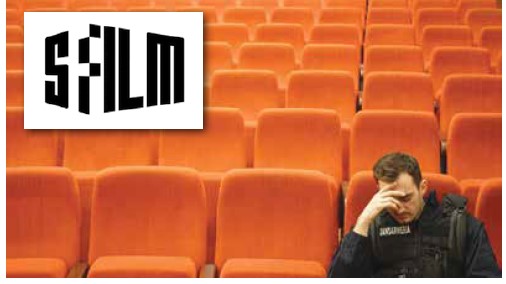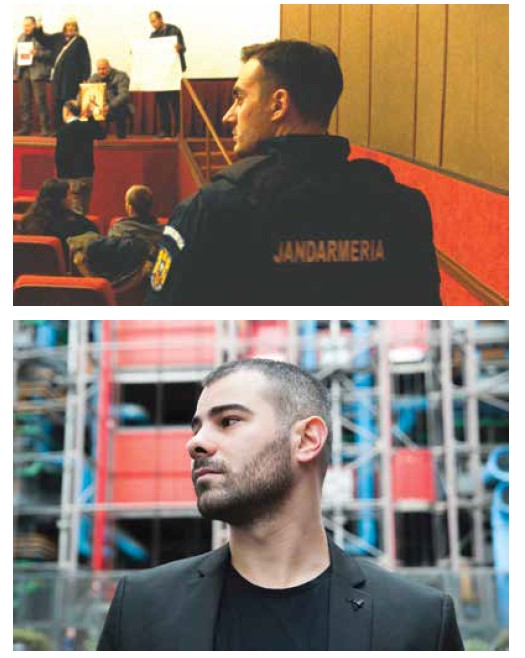By Gary M. Kramer–
The2021 San Francisco International Film Festival, April 9–18, offers dozens of features, shorts, and documentaries both online ( https://sffilm.org/ ), and outdoors at the Fort Mason Flix drive-in theater.
One of the festivals highlights is Poppy Field, director Eugen Jebeleanu’s striking debut, about Cristi (Conrad Mericoffer), a closeted Romanian man. He is first seen spending time with his French lover, Hadi (Radouan Leflahi), who is visiting Bucharest. Cristi’s sister Catalina (Cendana Trifan) shows up, unexpectedly, but deliberately, to meet her brother’s boyfriend.

However, things are chilly between the siblings, and Catalina upsets the lovers’ cozy domesticity. When Cristi heads off to work—he is a cop—he is forced to resolve a standoff in a movie theater, where an ultra-nationalist, homophobic group has disrupted the screening of a queer film.
During this extended sequence, Cristi attacks a gay man who could out him, forcing the cop to be exiled in the theater as the situation is resolved. One by one, various colleagues “babysit” Cristi, and try to calm him down. Each recounts a story of acceptance that never explicitly acknowledges what Cristi most fears. It’s a canny approach, and it culminates in a quietly powerful ending. Jebeleanu shoots with a handheld camera to capture Cristi’s emotions and expressions in what feels like real time. Mericoffer gives a remarkable performance; he is completely unselfconscious playing someone who is incredibly self-conscious.

I spoke with Jebeleanu via Zoom for the San Francisco Bay Times about Poppy Field.
Gary Kramer: Poppy Field starts out very micro with the gay couple and then gets more macro with the incident in the theater. Can you talk about making a film both personal and political?
Eugen Jebeleanu: I did not want this to be a coming out story. For me, it was important for the character to see how politics can influence our inner life, but also how intimacy is changed by political things. The idea was to show the context of Cristi’s life and his relationship. I wanted to show how he deals with this identity struggle, and how, during the conflict in the cinema, we see his own homophobia come out. It was important not to make him a victim or a hero, but to show all that we learn and live, and change our own options about ourselves and this subject.
Gary Kramer: What decisions did you make in presenting the relationship between Cristi and Hadi?
Eugen Jebeleanu: It was to show Cristi is not having an “adventure” for the first time, or one time. It’s more about the [long-distance] relationship being more serious, and how Hadi is staking the territory of Cristi’s apartment. This is what makes Cristi anxious; he doesn’t know how to share his space. He tries to feel free with his partner, but he’s not used to it, and doesn’t know how to react, move, be, or manage the situation. I wanted to show their relationship was not just about sex. It’s Cristi learning how to be who he is and understand himself. He’s creating a big monster from his own fears about what others will think, or will say, or judge.

Gary Kramer: Conrad Mericoffer is very intense and gives such an interior performance. How did you work with him on the role?
Eugen Jebeleanu: Conrad was really relaxed, but he expresses something mysterious and anxious at the same time. That is what makes the character so powerful. It’s about his inner anxiety. We don’t know where it’s coming from—from this event, or something deeper? Even though we talked about the character’s backstory, we never tried to understand his sexuality. His sexuality is not changing his way of being, acting, or speaking. It was more about his fears, and his difficulty to feel secure with himself and others. Not about how he lies or hides who he is, but more about what he has inside, and his authenticity. What was more difficult for him was seeing him in his silent moments and reactions. He’s not someone who is expressive.
Gary Kramer: Can you describe the attitudes about homosexuality in Romania?
Eugen Jebeleanu: A cop we talked with during pre-production said if they know someone is gay, they don’t discuss it; they don’t want to validate it—but they are not against it. I put the other cops in the film in the position of not knowing if they are against Cristi or not. In Romania, people are becoming more open to the idea of homosexuality—but we still have a lot of work to do. It’s still a taboo subject and we don’t talk about it. It comes from inequality between men and women, and this macho society, and anything that is non-traditional. The Orthodox church is very powerful here. They wanted to change the definition of family in the constitution.
© 2021 Gary M. Kramer
Gary M. Kramer is the author of “Independent Queer Cinema: Reviews and Interviews,” and the co-editor of “Directory of World Cinema: Argentina.” Follow him on Twitter @garymkramer
Published on March 25, 2021
Recent Comments